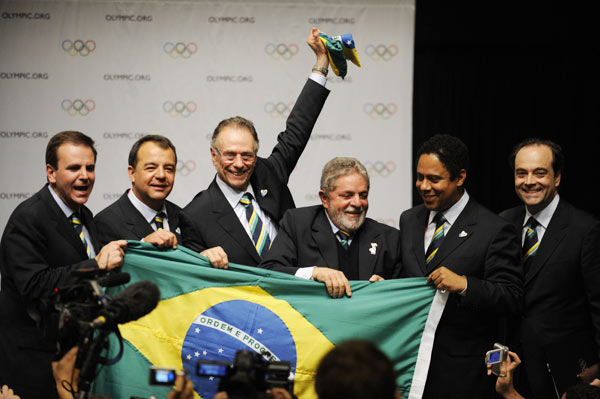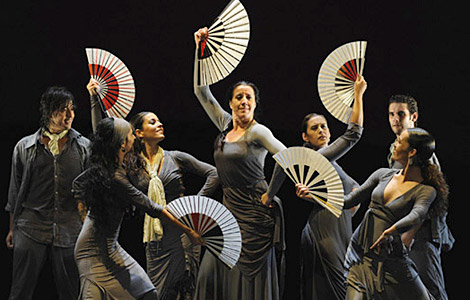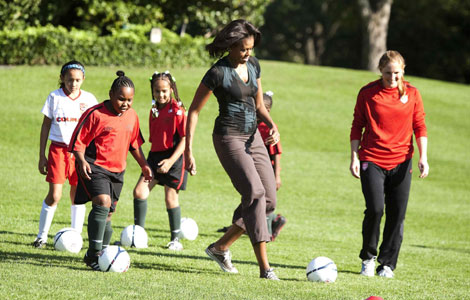Is Rio self-sufficient for 2016 Games?
Updated: 2011-10-05 08:09
(China Daily)
|
|||||||||||
 |
|
(Left-right) Rio Mayor Eduardo Paes, Governor of the State of Rio de Janeiro Sergio Cabral, Rio de Janeiro 2016 President Carlos Nuzman, former Brazilian President Luiz Inacio Lula da Silva, Brazilian Minister of Sport Orlando Silva and Secretary General of the Rio 2016 Bid Comittee Carlos Roberto Osorio pose after Rio de Janiero was announced as the winning bid for the 2016 Olympic Games on Oct 2, 2009, file photo in Copenhagen. [Photo/Agencies] |
RIO DE JANEIRO - Rio de Janeiro does not need foreign funding to stage the 2016 Games after abandoning plans to launch "Olympic bonds" worth $2 billion to help finance infrastructure projects, the city's new Olympics czar said on Wednesday.
Maria Silvia Bastos Marques, a former steel company executive who took up her new post in August, said the city was focusing on forming partnerships with private firms to complete stadium and transport improvements needed for Brazil's first Olympics.
"Looking at our projects, I don't see any need for any foreign funding. We have funding from the city treasury and the federal government," she said.
"It's partly because the world isn't in a good moment - capturing funds overseas is a little more complicated the way things are," she said, referring to the financial and economic malaise in the developed world.
The city's government said at the start of this year that 10 banks were interested in participating in Olympic bonds, but legal changes needed to approve the plan ran into bureaucratic hurdles.
Among the Olympic projects already in motion, the overhaul of the city's port area and the Sambadrome, a parade area known as the stadium of Samba, are being financed privately.
The Olympic village and Olympic Park, where most events will be held, are expected to be constructed through public-private partnerships.
Work to expand the city's subway system and build new rapid-bus expressways to ease congestion are also underway.
Rio's early Olympic work has been praised by the International Olympic Committee, in contrast to its lagging preparations for the 2014 World Cup that have been criticized by soccer's world governing body, FIFA.
Marques said the city did not plan to take advantage of a new law passed by Congress that allowed for bidding processes to be streamlined - a change that has been criticized as opening the way for overspending and corruption.
"The city is ahead of its timetable and delivering projects ahead of time," she said.
Rio bid officials originally said the 2016 Olympics would cost 23 billion reais ($12.8 billion).
Marques said the figure would change because of various alterations to Rio's plans since it won the bid in 2009, adding a new total should be released by the end of this year.
Reuters
Related Stories
Brazil plans to turn Rio shantytown to tourism spot 2011-07-12 16:10
IOC members visit construction work in Rio 2011-06-09 15:41
Prostitution latest target of Rio's Olympic change 2011-06-03 17:07
Rio de Janeiro to host 2016 Olympic Games 2009-10-03 01:05
Rio unveils logo for 2016 Games 2011-01-01 16:42
Obama mocks critics of his bid for 2016 Olympics 2009-10-21 11:16
- 35 killed in north China expressway crash
- Negligence cited in subway accident
- Jobs' biography rushed into print
- Tourism sees surge for National Day
- Forces assault on Gadhafi hometown
- Two Tibetans injured in self-immolation
- 'Golden Week' disappoints property developers
- Liberian, Yemeni women win Nobel Peace Prize
Hot Topics
Libya conflict, Gaddafi, Oil spill, Palace Museum scandal, Inflation, Japan's new PM, Trapped miners, Mooncake tax, Weekly photos, Hurricane Irene
Editor's Picks

|

|

|

|

|

|






